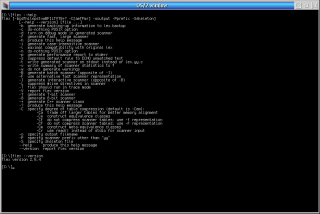Flex (The Fast Lexical Analyzer). Flex è un generatore veloce per l'analisi lessicale dei programmi. E' uno strumento di sviluppo software che controlla la corrispondenza di pattern nel testo. Flex è una implementazione gratuita (ma non GNU) dell'originale programma lex del sistema Unix.
Flex (The Fast Lexical Analyzer)
Versione:
2.6.4
Data rilascio:
Giovedì, 16 Novembre, 2017
Categorie:
Licenza:
- GPL
Interfaccia:
- Finestra comandi
Installazione con rpm
Questo programma si può installare usando il gestore pacchetti rpm. Vedi sotto per la stringa di installazione. I prerequisiti richiesti sono gestiti dal gestore pacchetti e, se necessario, scaricati e installati automaticamente.
flex-2.6.4-1.oc00 (12/06/2019)
- installa con ANPM o lanciando il comando:
yum install flex
- scarica manualmente come pacchetto ZIP:
http://rpm.netlabs.org/release/00/zip/flex-2_6_4-1_oc00.zip
changelog
* Wed Jun 12 2019 Silvan Scherrer <silvan.scherrer@aroa.ch> 2.6.4-1
- update to version 2.6.4
- use scm_ macros
- moved source to github
flex-debuginfo-2.6.4-1.oc00 (12/06/2019)
- installa con ANPM o lanciando il comando:
yum install flex-debuginfo
Installazione manuale
Il programma è distribuito come pacchetto ZIP: scaricare in una cartella temporanea e scompattare nella cartella di destinazione. Vedi sotto per il(i) link di download.
Qui di seguito trovi i link di download per l'installazione manuale del software:
| Flex (The Fast Lexical Analyzer) v. 2.6.4 (16/11/2017) | ||
 hobbes.nmsu.edu/download/pub/os2/dev/misc/flex-2.6.4.zip hobbes.nmsu.edu/download/pub/os2/dev/misc/flex-2.6.4.zip |
||
| Flex (The Fast Lexical Analyzer) v. 2.5.4 (16/2/1998) | Readme/What's new |
GNU flex, compiled with emx+gcc.
For OS/2, DOS and Win32.
- version 2.5.4a
- requires emx 0.9c or newer runtime
under OS/2 and RSXNT 1.40 or newer
runtime under Win32
- compiled by rommel@ars.de
- http://www.leo.org/pub/comp/os/os2/leo/... |
 www.os2site.com/sw/dev/gnu/flex254-2.zip www.os2site.com/sw/dev/gnu/flex254-2.zip |
||
| Flex (The Fast Lexical Analyzer) v. 2.3.8 (8/11/1995) | Readme/What's new |
C++ version of GNU flex (Runtime environment)
***CONTENT and SUPPORTED PLATFORMS
Firstly, this directory contains the runtime environment of flex++, which
was written by Alain Coetmeur, ported for the following platforms:
1) OS/2 2.xx/WARP 3.0 standalone (tested)
2) OS/2 2.xx/WARP 3.0 with EMX09a (tested)
3) DOS 5.0 32Bit protected mode standalone (tested, Version>3.0 promised, acc. to EMX)
4) DOS 5.0 32Bit protected mode with EMX09a (promised, Version>3.0 promised acc.to EMX)
5) DOS/WINDOWS 32Bit protected mode across DPMI with RSX (promised, acc. to RSX)
The directory also contains the 'makefile' which was used
to produce this environment from the original flex++ files.
The 'patch.emx' reports about one micro change which was needed
in respect to the original files.
It also reports a change in the skeletons for the generated code which allows
for counting lines as a builtin scanner task by means of the scanner (member)
variable 'yylineno'.
The variable can be renamed like others (e.g. yyleng) can be.
The sections of the manual page, which describe renaming of 'yyleng'
apply accordingly.
For further information about flex++ see the original files
(location e.g. 'ftp.th-darmstadt.de').
***CONTENTS IN DETAIL
00README EMX - this file
FLEX EXE - the EMX/RSX executable
FLEXSTA EXE - the standalone executable
FLEXSKEL CC - the Skeleton
FLEXSKEL H - the Header Skeleton
MAKEFILE - the makefile for EMX/gcc environment
FLEXPPM TXT - the manual page converted to text
INSTALL BAT - DOS install
INSTALL CMD - OS/2 install
PATCH EMX - patch report
***INSTALLATION
Platform 1-4:
-------------
1) Copy the file 'flexexe.taz' into the root directory of
any drive.
Or: if you have 'EMX', into the root directory of the drive,
where 'EMX' is installed.
2) Decompress and unpack with 'unzip flexpp.zip'
3) type 'cd flex <RET>' within a commandline.
4) type 'install <RET>'.
5) if you installed the standalone version of flex++, keep the directory
'<drive>:\flex' and add it to your 'PATH' variable. Otherwise you can delete
the directory and its contents.
Platform 5:
-----------
1) Change the 'emx' directories (bin, lib, include, ...) within 'install.bat'
to the appropriate directories under 'RSX', if needed.
2) Same procedure as for Platform 1-4.
***USAGE OF FLEX++ under DOS based Platforms (3-5)
Usage is as described in the manual page ('flexppm.txt') with one exception:
ALWAYS use the '-o<outfile>' option to specifiy the file
where the generated code shall be put (note: no space afer '-o'!).
This is due to the ancient filename constraints, DOS machines are suffering from.
Note, that the version of flex++ is produced on OS/2 with HPFS filesystem,
which doesn't know such constraints. As default output file this
flex++ wants to create a 'lex.yy.c' file which doesn't work, off course.
***GENERAL USAGE NOTE
For really utilizing the new set of features of flex++ related to C++ code
generation the files contained in 'ftp.th-darmstadt.de:/pub/.../bison++flex++misc*'
are very instructive.
Have fun,
Gregor Buehler (buehler@ibm.net) |
 www.os2site.com/sw/dev/gnu/flexpp.zip www.os2site.com/sw/dev/gnu/flexpp.zip |
Scheda aggiornata l'ultima volta il: 10/09/2019 - 08:28

This work is licensed under a Creative Commons Attribution 4.0 International License.

Aggiungi un commento